|
De Portugese dichter en schrijver Fernando António Nogueira Pessoa werd geboren in Lissabon op 13 juni 1888. Zie ook alle tags voor Fernando Pessoa op dit blog.
The Keeper Of Sheep II
My gaze is clear like a sunflower.
It is my custom to walk the roads
Looking right and left
And sometimes looking behind me,
And what I see at each moment
Is what I never saw before,
And Im very good at noticing things.
Im capable of feeling the same wonder
A newborn child would feel
If he noticed that hed really and truly been born.
I feel at each moment that Ive just been born
Into a completely new world
I believe in the world as in a daisy,
Because I see it. But I dont think about it,
Because to think is to not understand.
The world wasnt made for us to think about it
(To think is to have eyes that arent well)
But to look at it and to be in agreement.
I have no philosophy, I have senses
If I speak of Nature its not because I know what it is
But because I love it, and for that very reason,
Because those who love never know what they love
Or why they love, or what love is.
To love is eternal innocence,
And the only innocence is not to think
The Keeper Of Sheep VI
To think about God is to disobey God,
Since God wanted us not to know him,
Which is why he didnt reveal himself to us
Lets be simple and calm,
Like the trees and streams,
And God will love us, making us
Us even as the trees are trees
And the streams are streams,
And will give us greenness in the spring, which is its season,
And a river to go to when we end
And hell give us nothing more, since to give us more would make us less us.
Vertaald door Richard Zenith
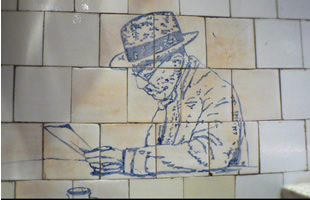
Fernando Pessoa (13 juni 1888 30 november 1935)
Portret in Café Martinho Da Arcada, Lissabon
De Nederlandse schrijver Willem Brakman werd geboren op 13 juni 1922 in Den Haag. Zie ook alle tags voor Willem Brakman op dit blog.
Uit: De grote schok was Rilke
Men ziet hoe onverzoenlijk men kan zijn, als men eigen trekken in een ander ontdekt. Toen ik dat mocht zien van het portret, zag ik het portret zelf ook weer scherper: een slap druipgezicht met te grote neus, weggeslagen kin, chinezensnor of, zoals ik het destijds met enige tevredenheid noteerde: een woudonanist.
Maar niet alle vooroordelen zijn fataal. Wat later nam ik Die Aufzeichnungen des Malte Laurids Brigge, weliswaar niet al te geestdriftig, ter hand. Het boek trof mij niettemin als een mokerslag. Rilke schreef het in Parijs, waar hij secretaris was van de beeldhouwer Rodin, die hem leerde zien en hem bevrijdde van het lyrische onbepaalde.
Opeens een genadeloos kijker kwam de werkelijkheid bij hem binnen en schreef hij een onvergetelijk boek over de vele vormen die de angst en de dood in een grote stad kunnen aannemen, in een bijna modern proza. Bijna modern, want ondanks alles handhaaft Rilke een poëtische ritmiek die in het werkelijk moderne proza ontbreekt (denk aan Handke en zijn gebruik van de stokkende en stotende omgangstaal). Malte is een gruwelijk boek over de werkelijkheid - hier toevallig Parijs - als storend element, als duistere achtergrond. Duister niet zozeer in de betekenis van onoverzichtelijk, maar van dreigend.
Het hoofdthema is eigenlijk het levensgevoel van de kunstenaar, gebouwd op een polariteit die men voor hetzelfde geld een verscheurdheid zou kunnen noemen. Een polariteit van rust - beweging, zwaarte - licht, waken - droom, werkelijkheid - spiegelbeeld, kosmos - chaos, dood - leven, heden - verleden, organisch - anorganisch en de alchemistische transmutatie van het ene in het andere tot een twee-eenheid waarvan de samenstellende delen als twee vijandige elementen worden gehandhaafd, wütend in einander gebissen und zu einem Einzigen verkrallt. Rilke, een meester in het doseren van het leed der ervaring, tast naar het voor hem net nog dragelijke (na het boek heeft hij inderdaad zelfmoord overwogen), maar wat hij ook overhoop haalt, hij blijft in het centrum. Hij blijft het natuurlijke uitgangspunt der mysterieuze gebeurtenissen of stemmingen; hij is daar waar alles van uitgaat en waartoe alles terugkeert.
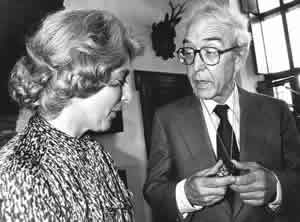
Willem Brakman (13 juni 1922 8 mei 2008)
Hier met minster Til Gardeniers van CRM in 1981
De Franse journaliste en schrijfster Tristane Banon werd geboren op 13 juni 1979 in Neuilly-sur-Seine. Zie ook alle tags voor Tristane Banon op dit blog.
Uit: Le bal des hypocrites
Aujourdhui, cest mon anniversaire. Il ny aura pas de fête ce soir. Jai 32 ans, mon téléphone est sur écoute, ma messagerie sans doute surveillée, quelquun met ses pas dans les miens et on maccuse de ne pas y aller, de ne pas porter le coup de grâce, de ne pas prendre tous les risques au nom des femmes et de la vérité.
Quon prenne ma vie, lhomme derrière moi et mon téléphone qui fait le mouchard, quon prenne le tout, je fais un prix de gros, et quavec ça on ait le courage de porter plainte, de savancer un peu plus vers lennemi et de livrer le combat.
Combien sont-ils ? Combien à promettre des témoignages si, daventure, il fallait ? Combien pour massurer dun soutien indéfectible ? Combien subitement disparus au moment de signer une déclaration écrite, quand il faut photocopier la pièce didentité qui authentifie la parole donnée ? Vas-y, Tristane, va défendre ton honneur, et noublie pas de venger toutes les femmes opprimées
Vas-y, on te regarde ! Quil est beau, le courage des déserteurs !
La nuit va glisser, de message en message, commentaires postés sur des forums de lecteurs, destinataires dune actualité prête à mâcher, internautes ravis de participer à un semblant de vie médiatique en donnant leur avis sur des images quon leur offre à manger comme de la pâtée à des chiens. Dheure en heure, jégrène les noms de ceux qui ne se prononcent pas, ceux qui insultent la petite salope qui a voulu faire du bruit médiatique à moindres frais. Ceux-là dénoncent.
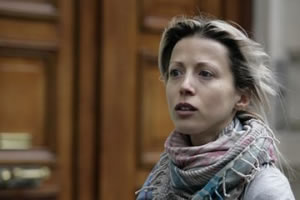
Tristane Banon (Neuilly-sur-Seine,13 juni 1979)
De Spaans-Galicische schrijver Gonzalo Torrente Ballester werd geboren op 13 juni 1910 in Serantes, Ferrol, Galicië. Zie ook alle tags voor Gonzalo Torrente Ballester op dit blog.
Uit: Les délices et les ombres (Vertaald door Claude De Frayssinet)
En définitive, la venue de Carlos Deza à Pueblanueva del Conde fut moins une arrivée quun retour, précédée par des annonces, voire des prophéties, comme si dun commun accord lon voulait lui donner de limportance ; et si les espoirs soulevés par un tel tapage navaient pas été déçus plus tard par lintéressé lui-même, ceut été parfait. Tout ce battage était vraiment inutile. Carlos nous avait quitté jeune, ou plutôt on nous lavait enlevé ; ensuite il est revenu. Beaucoup sen vont, et ceux qui retournent au pays ne sont pas tous des seigneurs, loin de là. Les uns rapportent de largent, une voiture et une léontine ; les autres, plus modestes, un chapeau de paille et un accordéon ; la plupart, une maladie dont ils meurent, et tous, sans exception, un nouvel accent, et ce besoin de parler des émigrés, de ceux qui doivent revenir, et des autres dont le retour est à jamais compromis par la honte dun sort contraire ou par la mort. Ils font tous partie du même groupe, dans la rue, les jours de fête ou au Cercle sils en sont membres ; on les respecte parce quils sont allés loin, quils ont vu du pays, et comme ils ont de lexpérience, on les consulte pour les élections, lemplacement de la nouvelle fontaine, le maintien éventuel des lignes dautobus desservant La Corogne ou une pétition au Gouvernement pour construire la voie ferrée promise. Mais Carlos nest pas allé bien loin. Il na rapporté ni voiture ni léontine, pas même un accordéon ; et si on lui demande son avis sur la nouvelle fontaine, il hausse les épaules et sourit.
Cétait donc, répétons-le, plus un retour quune arrivée ; et il était inutile de faire tant dhistoires. Annonces et prophéties pullulaient, certes, mais ce petit jeu était à la portée du premier venu. Ah, bien sûr ! il nest pas parti en Amérique, comme beaucoup, dans ces contrées où il faut braver le destin et la mort. Certains nous ont quittés et cest à peine si lon se souvient. Don Fernando, le père de Carlos, député à Madrid, est revenu un beau jour au pays, sest marié et a vécu dans son pazo.
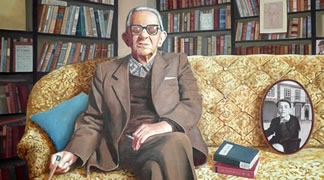
Gonzalo Torrente Ballester (13 juni 1910 27 januari 1999)
De Britse schrijver en presentator Marcel Theroux werd geboren op 13 juni 1968 in Kampala, Oeganda. Zie ook alle tags voor Marcel Theroux op dit blog.
Uit: Thoughts On Short Fiction
Lets begin at the beginning how do you start writing a short story? Is it important to have a strong sense of the plot and arc of the story to begin with? Can you give us a little about how the idea for The Ordeal of Toby Trubshaw came about?
At the risk of demeaning my own credentials at the outset, I have to say I dont consider myself to be a master of the short story. There are writers Helen Simpson, Lorrie Moore, William Trevor, Alice Munro who write, solely or mainly, short stories. I consider myself a fan and a student of the genre. Having said that, I do think a lot of bunk is talked about short stories. I mean, I enjoy all these writers and I love Chekhov, but I feel theres a way that the quote unquote literary short story has unfairly hogged the limelight. A short story is a great way to explore mood, a pregnant silence, a seemingly mundane scenario thats somehow charged with significance. But I dont see why that kind of short story is the only kind or necessarily the most valid. A short story is just short. Beyond that I think anything is possible. I also love genre pieces, horror, speculative fiction Saki, Poe, Lovecraft, John Collier, Wodehouse, the unclassifiable flights of Borges, etc. Okay, end of homily.
There are broadly two ways to approach any piece of writing, in my opinion. One is where you have an idea of where the whole thing is heading: worldly roué meets young woman in Yalta; falls in love in spite of himself; faces an uncertain future, in the case of Lady with the Lapdog. The other is where you have a phrase, an image, maybe a single line that fascinates you and provokes you into elaborating it.
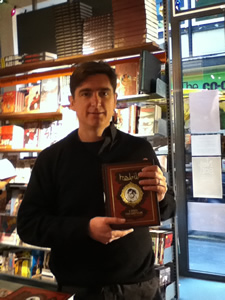
Marcel Theroux (Kampala, 13 juni 1968)
Zie voor nog meer schrijvers van de 13e juni ook mijn vorige blog van vandaag.
13-06-2012 om 20:02
geschreven door Romenu 
Tags:Fernando Pessoa, Willem Brakman, Tristane Banon, Gonzalo Torrente Ballester, Marcel Theroux, Rainer Maria Rilke, Romenu
|

